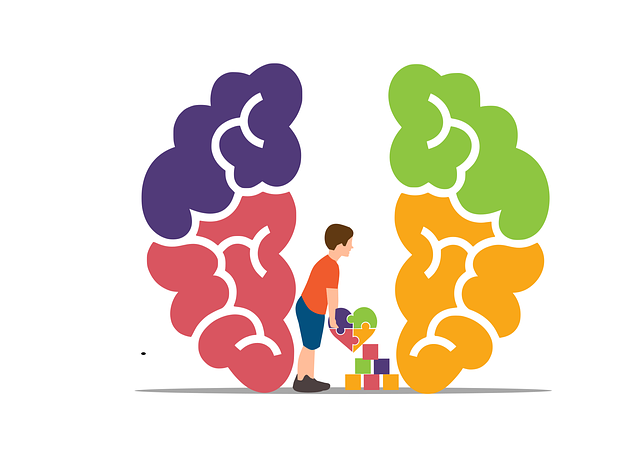Denver faces a growing mental health crisis with postpartum depression (PPD), with many cases undiagnosed or untreated due to stigma. To address this, tailored Mental Health Education Programs using conflict resolution strategies and risk assessment tools are essential. These programs, focusing on Denver Postpartum Depression Therapy, integrate wellness coaching, mindfulness, stress reduction, and community support to enhance emotional resilience and long-term well-being. Effective coaching involves evidence-based practices, standardized evaluations, and cultural competency training, ensuring comprehensive care accessible to all Denver residents.
In Denver, navigating postpartum depression (PPD) is a crucial aspect of new mothers’ overall mental wellness. This article explores the development of mental wellness coaching programs tailored to address PPD, offering a local perspective on this growing need. We delve into the critical role coaches play in perinatal support, providing evidence-based strategies for effective coaching. From program design to evaluation, discover how these initiatives enhance the well-being of Denver mothers, offering promising solutions to combat PPD and promote resilience.
- Understanding Denver's Postpartum Depression Landscape: A Local Perspective
- The Role of Mental Wellness Coaches in Perinatal Support
- Designing Effective Coaching Programs for New Mothers
- Integrating Evidence-Based Practices into Coaching Sessions
- Measuring Success and Impact: Evaluation Strategies for Coach-Led Therapy
Understanding Denver's Postpartum Depression Landscape: A Local Perspective

Denver, a vibrant city known for its bustling landscape, also faces a critical mental health challenge: postpartum depression (PPD). The local perspective reveals a growing awareness and need for specialized support for new mothers. According to recent studies, PPD affects a significant portion of Denver’s population, with many cases going undiagnosed or untreated due to the stigma surrounding mental health issues. This local insight underscores the importance of developing tailored programs that address the unique needs of postpartum parents within the community.
The design of effective Mental Health Education Programs should incorporate strategies like conflict resolution techniques to foster support networks among new parents and risk assessment tools for professionals, ensuring safe and inclusive environments. By integrating these elements, Denver can revolutionize its approach to PPD therapy, offering comprehensive care that empowers families and promotes overall mental wellness in the community.
The Role of Mental Wellness Coaches in Perinatal Support

Mental wellness coaches play a pivotal role in providing perinatal support, addressing the unique challenges faced by new parents. The perinatal period, encompassing pregnancy and the postpartum phase, is a time of immense emotional flux, where hormonal changes, life transitions, and increased responsibilities can contribute to heightened stress levels. Mental wellness coaches offer a non-judgmental space for individuals struggling with perinatal depression or anxiety in Denver, tailoring support to meet their specific needs.
Through evidence-based practices and trauma-informed care, these coaches foster emotional intelligence, helping clients develop coping strategies to navigate the complexities of parenthood. They provide practical tools for time management, self-care, and stress reduction, enabling new parents to thrive during this transformative period. By integrating mental wellness into the postpartum experience, coaches contribute to long-term resilience and overall well-being, ensuring parents feel equipped to face life’s challenges head-on.
Designing Effective Coaching Programs for New Mothers

New motherhood is a transformative period that can bring immense joy but also significant challenges. Designing coaching programs tailored to this demographic is crucial for supporting new mothers’ mental wellness. The high incidences of postpartum depression (PPD) in Denver and across the nation highlight the need for specialized interventions. These programs should focus on holistic support, incorporating techniques like mindfulness, stress reduction methods, and emotional regulation strategies to empower mothers during this pivotal time.
By offering tailored coaching sessions, new mothers can learn effective stress management workshops and gain valuable coping mechanisms. Incorporating these practices into daily routines enables them to navigate the physical and emotional demands of motherhood more gracefully. Moreover, fostering a supportive community through group sessions or online forums can provide a safe space for sharing experiences and building connections, further enhancing the overall mental wellness of new mothers.
Integrating Evidence-Based Practices into Coaching Sessions

Incorporating evidence-based practices into mental wellness coaching sessions is a key strategy for effective support and recovery. Coaches in Denver, particularly those specializing in postpartum depression therapy, can utilize techniques proven to reduce symptoms and improve overall well-being. For instance, integrating burnout prevention strategies like mindfulness exercises and stress management techniques can equip clients with tools to navigate challenging situations. Empathy building strategies are also vital; fostering a safe, non-judgmental space encourages open dialogue and strengthens the therapeutic alliance.
Additionally, mental wellness coaching often benefits from structured activities such as journaling exercises designed to promote self-reflection and emotional awareness. This practice, inspired by research on the power of introspection, offers guidance for clients navigating complex emotions. By combining these evidence-based practices, coaches create a comprehensive approach tailored to individual needs, ensuring their Denver postpartum depression therapy is both effective and supportive.
Measuring Success and Impact: Evaluation Strategies for Coach-Led Therapy

Measuring success and impact is a critical aspect of coach-led therapy, ensuring that programs effectively address mental health concerns. Evaluation strategies should go beyond mere satisfaction surveys to assess tangible improvements in clients’ emotional well-being. This involves utilizing standardized tools and qualitative data to track progress over time, such as the Perinatal Depression Scale for postpartum depression in Denver. By comparing pre-and post-intervention scores, coaches can quantify changes in symptoms, offering concrete evidence of program effectiveness.
Additionally, long-term follow-up assessments are valuable to gauge whether clients maintain their progress and developed inner strength that translates into improved coping mechanisms. These evaluation methods not only hold coaches accountable but also help refine the coaching process, tailoring techniques for better outcomes. Incorporating Healthcare Provider Cultural Competency Training can further enhance these evaluations by considering diverse client backgrounds and ensuring inclusive practices in coach-led therapy.
Mental wellness coaching programs have emerged as a valuable resource in addressing Denver’s postpartum depression landscape. By integrating evidence-based practices and focusing on perinatal support, these programs offer tailored coaching for new mothers. Through effective design, measurement strategies, and local perspectives, coaches can significantly enhance mental health outcomes, providing a supportive network for those navigating this challenging period. Implementing these programs ensures that Denver residents have access to innovative and accessible postpartum depression therapy.














